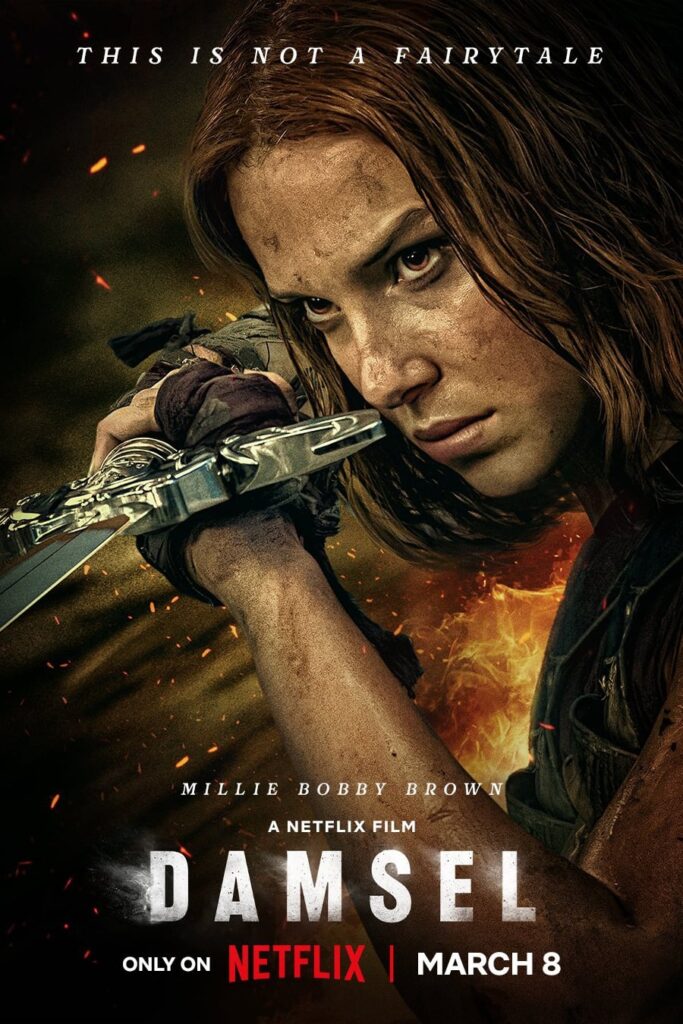
Damsel: This Netflix Film Might Not Be the Fairytale You Expect, release date, cast, plot and more
Step into the world of “Damsel,” a Netflix film that shatters the traditional fairytale narrative, offering audiences a dark, captivating, and ultimately empowering story. Released on March 8, 2024, coinciding with International Women’s Day, the film reimagines the damsel-in-distress trope, presenting a heroine who defies expectations and carves her own path.
A Twisted Tale: Plot and Themes
“Damsel” follows Elodie (Millie Bobby Brown), a young woman raised in the idyllic kingdom of Eldora. Obedient and dutiful, she readily agrees to marry Prince Henry (Nicholas Galitzine) to secure prosperity for her kingdom. However, her idyllic wedding day takes a turn for the macabre when she discovers she’s not destined to be a queen, but a sacrifice to appease a fire-breathing dragon plaguing the land.
Thrown alive into a dark, cavernous pit, Elodie finds herself face-to-face with the dragon, but it’s not the monstrous beast she envisioned. Instead, the creature, dubbed “Ajax” by Elodie, is a witty, sarcastic, and surprisingly gentle being. Together, they forge an unlikely alliance, escaping the cave and embarking on a journey that challenges their very perspectives on duty, sacrifice, and the true meaning of love.
Some key aspects:
Deconstructing the Damsel:
Elodie, unlike the passive damsels of classic fairytales, takes charge of her destiny. She’s resourceful, brave, and fiercely independent. She actively defies the expectations placed upon her, refusing to be a mere pawn in a political game.
Reframing Sacrifice:
The film challenges the notion of sacrifice as a noble act often forced upon women. Elodie’s intended sacrifice highlights the patriarchal structures that prioritize the needs of men and power over the lives and choices of women.
Redefining Gender Roles:
Both Elodie and Princess Daphne (Angela Bassett), Elodie’s formidable mother, break free from traditional female archetypes. Daphne, a strong and skilled warrior, defies the typical queenly image, while Elodie sheds her damsel-in-distress label, proving her strength and resilience.
Unconventional Love Story:
The bond between Elodie and the dragon, Ajax, is far from the typical romantic fairytale trope. Their friendship is built on mutual respect, understanding, and shared experiences, offering a refreshing alternative to the usual damsel-prince love story.
Cast and Crew
The film boasts a stellar cast, bringing the characters to life with depth and nuance:
Millie Bobby Brown delivers a powerful performance as Elodie, capturing her initial naivety, blossoming strength, and fierce determination. Brown’s portrayal breaks new ground, showcasing her versatility and talent in portraying a complex and non-stereotypical female protagonist.
Nicholas Galitzine embodies the role of Prince Henry, initially portraying the charming prince but gradually revealing his manipulative and self-serving nature.
Angela Bassett adds an air of regality and strength to the film as Queen Daphne, Elodie’s progressive and warrior-like mother.
Ray Winstone lends his gravitas to the role of King Richard, Prince Henry’s father, a cunning and power-hungry leader.
Juan Carlos Fresnadillo, the film’s director, known for his work on “Intruders” and “28 Weeks Later,” masterfully crafts a visually stunning and suspenseful film. The use of dark, gothic imagery and dynamic action sequences creates a thrilling atmosphere that complements the narrative.
Beyond the screen
“Damsel” offers more than just entertainment; it prompts critical thinking and discussion. Here are some questions to consider:
– How does the film challenge traditional gender roles and expectations?
– What message does the film convey about sacrifice and personal agency?
– What are your thoughts on the unconventional love story between Elodie and Ajax?
– How can “Damsel” be seen as a commentary on societal expectations and pressures?
– What potential impact can films like “Damsel” have on the portrayal of women in popular culture?
Delving Deeper: Feminist Retellings and Fairytale Reimaginings
“Damsel” is not the only example of a recent trend in film and television that critiques and reimagines traditional fairytales through a feminist lens. Shows like “The Handmaid’s Tale” and “Once Upon a Time” also offer alternative narratives that challenge the traditional tropes often associated with fairytales. These contemporary retellings explore the complexities of women’s experiences, highlighting themes of power, agency, and resistance.
Conclusion: A Fairy Tale for the Modern Age
“Damsel” might not be the fairytale you expect, but it’s precisely this deviation from the norm that makes it a captivating and thought-provoking film. By subverting expectations and offering a female protagonist who actively defies stereotypes, the film encourages viewers to question societal norms and empowers them to chart their own unique paths. While not every viewer will find themselves swept away by its dark tone and unconventional narrative, “Damsel” undoubtedly leaves a lasting impression, sparking conversations and challenging perspectives on gender roles, sacrifice, and the power of female agency.
Additional Information:
Release Date: March 8, 2024
Streaming Platform: Netflix
Director: Juan Carlos Fresnadillo
Cast: Millie Bobby Brown (Elodie), Nicholas Galitzine (Prince Henry), Angela Bassett (Queen Daphne), Ray Winstone (King Richard)
Running Time: 105 minutes